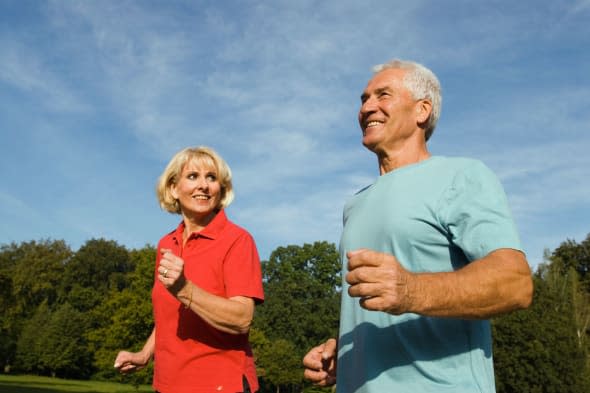How good is your bone health?

As we get older, most of us will be only too aware of the changes in our appearance, but what goes on beneath the surface may not be quite so obvious. For instance, from the age of 40 onwards, our bone density naturally declines, increasing the risk of osteoporosis, a condition that weakens the bones and makes them more fragile and prone to breaks.
Related Searches
According to the NHS, one in two women and one in five men over the age of 50 in the UK break a bone, and the most common cause is osteoporosis. And since the condition has no other symptoms, a break or fracture may be the first time you become aware that there's a problem.
However, there is plenty you can do to keep your bones strong and healthy as you get older, to reduce your risk of osteoporosis by making these simple lifestyle changes.
Exercise
The benefits of physical activity are many and varied, improving everything from heart health to mental wellbeing. It's also a great way to strengthen the bones and reduce the risk of injury. Aim to build up to five hours of weight-bearing exercise such as walking, running, and dancing, or sports such as tennis, badminton or golf. Weight training will also help to keep the bones strong, and you don't need to hit the gym to get the exercise you need - gardening, housework and carrying the grocery shopping will do the job.
Eat right
It should come as no surprise to know that calcium is key to healthy bones. It is recommended that adults consume at least 700mg of calcium each day, and 1,200mg if you've already been diagnosed with osteoporosis, so don't ditch the dairy products. In just one glass of milk, a thick slice of cheddar or a portion of yoghurt, you'll get around 1,000mg so getting your daily allowance shouldn't be a problem. And if you're lactose intolerant, you can still get your dose by way of white beans, sardines, leafy greens and almonds, while some products such as instant oatmeal, orange juice and soy milk are fortified with calcium.
On the other hand, too much protein causes the body to make acid, which drains the calcium away and consequently leaves bones weaker. You don't need to cut out the meat, fish and eggs, but make sure you're eating a balanced diet rich in fresh fruit and veg, dairy and carbs. Salt is another foodie substance to beware of. It is thought to speed up calcium loss in the body, so try to stick to the recommended 6g daily limit, and be careful when buying processed foods and ready meals, since the salt levels can be surprisingly high.
Get outdoors
All the calcium in the world is no use unless your body is able to absorb it, and to do that, it needs vitamin D. While this too can be found in foods such as oily fish, egg yolks and liver, the easiest way to get enough of the good stuff is to get out in the sun. For most, just 15 minutes of sunshine two or three times a week does the trick, but if you're worried you may be at risk of a deficiency, it's worth checking with your GP.
Drink to good health
From that morning caffeine pick-me-up to the evening glass of vino, there are a number of drink choices that could cause problems for your bones. Alcohol, tea, coffee and fizzy pop are all known to reduce the amount of calcium your body absorbs, so keep your booze intake within the recommended levels (two to three units for women and three to four units for men each day, with regular 'days off'), and quench your thirst with a healthy glass of H2O to keep your bones in tip-top shape. And if you're a smoker, quit. Smokers are known to be more susceptible to osteoporosis.
%VIRTUAL-AFCSponserAds%
Beware of weight loss
You might be worried about that middle-aged spread, and you should, of course, exercise and eat well to maintain a healthy weigh. But crash dieting or losing weight too fast or too much can increase your chances of developing osteoporosis, especially in women, since it can reduce the amount of oestrogen in the body, a hormone that protects those all-important bones. If you are overweight, seek professional advice on how to shift the excess pounds in a sensible and healthy way.
Are you taking steps to reduce your risk of osteoporosis? Leave your comments below...




